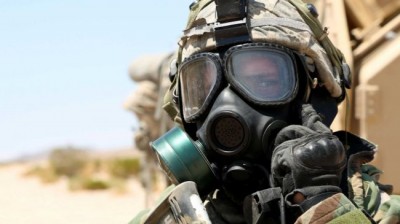Obama Doubles US Troop Strength in Iraq

The Pentagon announced Friday that President Obama has approved sending another 1,500 troops to Iraq, effectively doubling the size of the US deployment there. The move is part of a rapid escalation of the war in Iraq and Syria, and comes only days after the US midterm elections.
While the Obama administration maintains the pretense that this sizeable troop increase does not mean a return to combat, the distinction has become all but meaningless.
White House spokesman Josh Earnest said the additional US troops would serve “in a noncombat role to train, advise and assist Iraqi security forces, including Kurdish forces,” adding “US troops will not be in combat, but they will be better positioned to support Iraqi security forces as they take the fight to” the Islamic State of Iraq and Syria (ISIS), the nominal target of the US intervention.
In practice, this means that US “advisers” will be serving as de facto commanders of Iraqi troops engaged in ground combat with ISIS, while US warplanes operate as the tactical air support. Both the advisers and the airmen will be in combat, and the inevitable casualties will be added to the 4,500 US soldiers killed since the 2003 invasion and occupation of Iraq—along with as many as one million Iraqi men, women and children.
According to the Pentagon statement, the additional forces will establish “two expeditionary advise and assist operations centers, in locations outside of Baghdad and Erbil.” These are the two cities (the capitals of Iraq and of the Kurdish Regional Authority, respectively) where most of the 1,400 US troops already in Iraq are deployed.
At least 630 of the troops will be working with Iraqi Army troops in the western Anbar Province, most of which is controlled by ISIS. Since the entire province is a battlefield, these American forces are going into combat.
The remaining 870 troops will be spread out in multiple locations across the country, including such hotly contested areas as Salahuddin and Diyala provinces, northwest and northeast of the Iraqi capital, where there has been heavy fighting in the past three months.
The goal is to train 12 brigades of troops, nine in the Iraqi Army and three in the Kurdish militia, the Peshmerga, for a ground offensive against ISIS that would begin early in 2015. Several other countries will send “trainers” as well, said Rear Admiral John Kirby, the chief Pentagon spokesman.
Denmark is the latest to enlist in the new US-backed campaign, which is being waged in flagrant violation of international law. The country is committing 120 trainers for the purpose. Britain, France, Germany, Australia, Canada and the Netherlands have all agreed to send warplanes, ground support personnel for the air war or military trainers, or some combination of all three.
Admiral Kirby said that the request for additional troops was proposed by the government of Iraq and the US military command. It was submitted to Obama by Secretary of Defense Chuck Hagel earlier this week, with a recommendation that he approve the deployment, “in concert with the development of a coalition campaign plan to defend key areas and go on the offensive against the Islamic State…”
On Thursday, speaking at the Atlantic Council in Washington, Gen. Lloyd Austin, commander of CENTCOM, whose region includes the entire Middle East, said, “If I think we need to do more things, or if we need better capability, I won’t hesitate to make that recommendation to my boss. It’s what military leadership should do.”
The Iraq troop announcement completely overshadowed the previously announced White House meeting Friday afternoon, where President Obama sat down with a bipartisan group of senators and congressmen, including the leadership of the Republican and Democratic parties, for their first postelection discussions. That meeting included an extensive briefing on the war in Syria and Iraq by CENTCOM Commander Austin, Defense Secretary Hagel and other officials.
The meeting’s official purpose was to begin discussions on areas of possible agreement between the White House and Republican congressional leaders, who will control the Senate as well as the House as a result of the November 4 election.
Advance press reports have suggested possible deals on tax cuts for large corporations, pro-corporate trade deals in Asia and Europe, and the adoption of a budget for the remainder of the 2015 fiscal year that holds down spending to the levels imposed in the wake of the so-called sequester cuts of 2012 and 2013.
The timing of the Iraq troop announcement demonstrates the most important area of bipartisan collaboration: imperialist aggression overseas. Both big-business parties prostrate themselves before the military-intelligence apparatus, regardless of how seats and offices are divided among the Democrats and Republicans.
Discussions on Washington have included the possibility of a new and more expansive Authorization to Use Military Force (AUMF), aimed at giving a post facto bipartisan stamp of approval to war in both Iraq and Syria.
To pay for the troop deployment, the White House will also seek a supplemental appropriation of $5.6 billion from Congress. Budget Director Shaun Donovan said the request was “an opportunity for Congress and this administration to work together to provide the additional resources needed to degrade and ultimately defeat ISIL[ISIS].”
There is little doubt that Congress will jump at the chance to fuel the bloodbath in the Middle East. Republican congressional leaders have been demanding a more aggressive military policy in Iraq and Syria, including the commitment of ground troops, and an open declaration that the goal of the intervention is not just to destroy ISIS, but to overthrow the Syrian regime of President Bashar al-Assad.
This is the real purpose of the US military intervention, although Obama sought to conceal it during the election campaign, given the overwhelming opposition among the American people to the prospect of a major new war in the Middle East.

